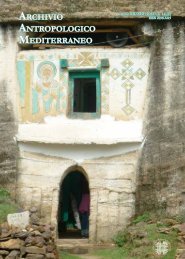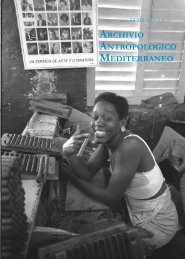“Arabi della panna”. Dominio e dissenso tra i - Archivio ...
“Arabi della panna”. Dominio e dissenso tra i - Archivio ...
“Arabi della panna”. Dominio e dissenso tra i - Archivio ...
You also want an ePaper? Increase the reach of your titles
YUMPU automatically turns print PDFs into web optimized ePapers that Google loves.
<strong>Archivio</strong> Antropologico MediterrAneo on line, anno XII/XIII (2012), n. 14 (1)<br />
José antonio González alcantuD<br />
Departamento de Antropología Social<br />
Facultad de Filosofía y Le<strong>tra</strong>s<br />
Campus de Cartuja<br />
jgonzal@ugr.es<br />
Ercole, eroe mediterraneo, nelle <strong>tra</strong>dizioni sulla fondazione<br />
delle città andaluse<br />
Nel racconto di fondazione di molte città andaluse – Cadice,<br />
Siviglia e Granada soprattutto – Ercole, o i suoi<br />
predecessori o epigoni, compaiono come eroi fondatori.<br />
I tentativi di identificare dei padri fondatori delle città<br />
andaluse cercano di ricuperare il racconto dell’Antichità<br />
di fronte al periodo islamico. La presenza di questi racconti<br />
diverrà più forte nei secoli XVI e XVII, soprattutto<br />
nei cronisti delle “antichità ed eccellenze” delle città andaluse.<br />
La presenza del Mediterraneo e dei suoi eroi, soprattutto<br />
il diluviano Tubal e dell’Ercole greco-africano,<br />
sarà una costante.<br />
Parole chiave: Andalusia; Racconti di fondazione; Ercole;<br />
Mediterraneo; Cronache spagnole<br />
Hercules, Mediterranean hero, in the <strong>tra</strong>ditions on the<br />
foundation of Andalusian towns<br />
In the foundation story of several Andalusian towns – Cadis,<br />
Sevilla and Grenada above all – Hercules or his predecessors<br />
or epigones appears as founding heroes. The attempts to identify<br />
founding fathers of Andalusian towns try to recover the<br />
Antiquity’s tale against the Islamic period. It is during the<br />
XVI th and XVII th Centuries when these stories will gain a<br />
wider influence especially in the chroniclers of Andalusian<br />
town’s “antiquities and excellences”. The presence of the<br />
Mediterranean and its heroes, mainly the diluvian Tubal and<br />
the Greek-African Hercules, will be a constant.<br />
Keywords: Andalusia; Foundation Stories; Hercules; Mediterranean;<br />
Spanish Chronicles<br />
Pino schirriPa<br />
Università degli Studi di Roma “La Sapienza”<br />
Dipartimento di Storia, Culture, Religioni<br />
pino.schirripa@uniroma1.it<br />
Grossisti, farmacie, ONG e medicina <strong>tra</strong>dizionale. Il mercato<br />
dei farmaci <strong>tra</strong> pubblico e privato in Tigray (Etiopia)<br />
Dopo la guerra civile e la sconfitta del DERG (1991),<br />
il nuovo governo etiope ha dato inizio a una politica di<br />
liberalizzazione economica. Questa ha coinvolto anche il<br />
settore sanitario, che ha visto la nascita di nuove imprese<br />
sia nel settore clinico sia in quello <strong>della</strong> distribuzione e<br />
114<br />
vendita di farmaci; oggi in Etiopia nel settore farmaceutico<br />
coesistono strutture pubbliche e private.<br />
L’articolo fornisce un quadro dell’organizzazione <strong>della</strong><br />
distribuzione dei farmaci in Tigray at<strong>tra</strong>verso l’analisi<br />
delle politiche dei grossisti pubblici e privati. Si illus<strong>tra</strong><br />
anche il mercato dei farmaci analizzando i differenti tipi<br />
di venditori (farmacie pubbliche e private, drug-shops e<br />
rural drug-shops), le ONG e il mercato informale <strong>della</strong><br />
medicina <strong>tra</strong>dizionale, focalizzandosi su come gli individui<br />
si muovano in questo complesso sistema per far<br />
fronte ai propri bisogni di salute.<br />
Parole chiave: Etiopia; Farmaci; Antropologia medica;<br />
Ong; Medicina <strong>tra</strong>dizionale<br />
Wholesalers, pharmacies, NGOs and <strong>tra</strong>ditional medicine.<br />
Market of drugs between public and private in Tigray (Ethiopia)<br />
After the Civil War and the defeat of Derg (1991), the<br />
new government in Ethiopia has started a program of<br />
liberalization of economy. This has involved the health<br />
system too, giving rise to new health enterprises both in<br />
clinical sector and in distribution and selling of pharmaceutical<br />
drugs. As a consequence, nowadays in Ethiopia<br />
in the pharmaceutical sector there public and private facilities<br />
co-exist.<br />
The paper gives a sketch of organization of distribution<br />
of drugs in Tigray Region through the description of the<br />
policies of public wholesalers and private ones as well. It<br />
illus<strong>tra</strong>tes also the market of drugs analyzing the different<br />
kinds of drug sellers (private and public pharmacies,<br />
drug-shops and rural drug-shops), the charity sector, and<br />
the informal market of <strong>tra</strong>ditional medicine focusing in<br />
how people cope with this complex context in facing their<br />
health and care needs.<br />
Keywords: Ethiopia; Pharmaceuticals; Medical Anthropology;<br />
Ngo; Traditional Medicine<br />
Giovanni orlanDo<br />
giovanni.orlando79@gmail.com<br />
The dilemmas of anthropology ‘at home’ when your home<br />
is Sicily: between problem-solving critique and appreciative<br />
inquiry<br />
This article deals with problems of emotion and positionality<br />
stemming from my fieldwork in Palermo as a ‘native<br />
anthropologist’. It begins with a brief narrative of the casual<br />
life circumstances that brought me to study the city,<br />
before critically analysing in section one the regional <strong>tra</strong>dition<br />
of research. Since the 1970s, Sicily has been at the<br />
centre of scholarly debates largely dealing with negative<br />
aspects: dependency, honour and shame, mafia. After re-






